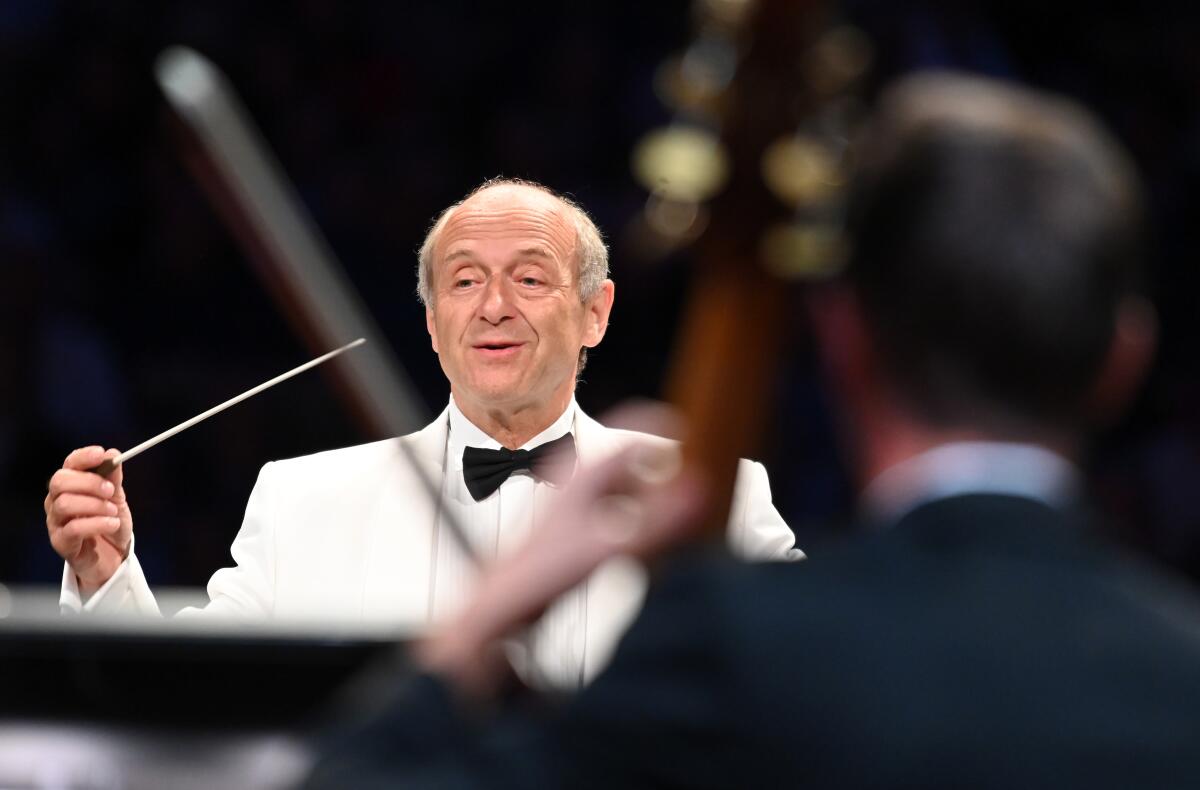Mozart’s Requiem at the Hollywood Bowl takes on special relevance in tragic times

- Share via
The Hollywood Bowl flags flew at half-staff Tuesday, and a requiem was the main business of the evening. The concert was not dedicated to the victims of America’s three recent shootings, nor to Toni Morrison, who had died the day before. The requiem had been scheduled months earlier as part of the Budapest Festival Orchestra’s touring Mozart program, which began with the composer’s 41st and final symphony, the “Jupiter,” and concluded with his unfinished Mass, written during his final days.
But the concert was a memorial of gripping power nonetheless, with an astonishing relevance to the tragic deaths in Gilroy, Calif.; El Paso; and Dayton, Ohio. Mozart’s final utterance further illuminated what made Morrison one of America’s, and the world’s, most meaningful voices, a writer for whom, like Mozart, comprehending the seemingly unnerving times we live in was a compulsory activity.
There is anger in Mozart’s Requiem, written as he lay dying at age 35. An opera composer, Mozart interrupted work on the Requiem to finish “The Magic Flute” and to write his final ode to humane governance, “La Clemenza di Tito.” With the Requiem, he was the first to so operatically dramatize the rite of the dead, and the Hungarian conductor at the Bowl, Iván Fischer, was a merciless Mozartean who brought out the outright fury that much of America feels.
The “Day of wrath, day of anger” of the “Dies Irae,” for instance, became this very Tuesday. Each word of Latin text was spit out by the Los Angeles Master Chorale, making Mozart’s unspeakable might astoundingly singable. There was, as well, beauty to behold, which is also compulsory in Mozart. The finely focused orchestral playing was an enthralling mix of creamy modern strings with fruit-honeyed winds and piquant brass instruments from Mozart’s time. The solo vocal quartet (Jeanine De Bique, Kelley O’Connor, Michael Schade and Adam Plachetka) were all viscerally compelling to watch on the video screens, as was Fischer.
Even so, Mozart’s guide to grief is not a call to action. Nor does it offer a spiritual GPS to heaven. Just the opposite. With only the first parts completed, the rest of the Requiem is either a filling-in of Mozart’s sketches or altogether new music by Mozart pupils. Throughout the hourlong work, genius is gradually replaced by talent, no longer serving as a great composer’s final will and testament but a gradual transition from one state of being to another. The mantle of Mozart becomes an artistic keepsake for the next generation.
Morrison, too, wore that mantle. Through her deep influence on the director Peter Sellars, who has revolutionized the modern approach to Mozart, she thus had a transformative effect on what Mozart means today. Sellars, in fact, made that unmistakable when he placed Morrison’s presence front-and-center at his New Crowned Hope Festival in Vienna, in 2006 the most important celebration of the 250th anniversary of Mozart’s birth. We no longer can ask only what Mozart did but what his music asks of us now.
As it turns out, Sellars also has had a transformative influence on the Master Chorale, which has just returned from performing a Sellars production in Mozart’s birthplace, opening the Salzburg Festival. At the Bowl, the chorus was like putty in Fischer’s dramatic hands. It was ferocious, precise and excellently amplified, in-your-face at exactly the right spot.
Fischer did not allow the final not-Mozart sections their perfunctory function. He ended big. Morrison’s Mozartean way was also to be decisive but less unstoppable, leaving more openings, more room for questions than answers. Still, the performance took the breath away.
The “Jupiter” did not in quite the same way. The performance was alert, alive, lyric, vivid and exquisitely played. Not a phrase went by unconsidered. But if the symphony performance was the Bowl at its Mozartean best, it was also at its best business as usual. The Requiem was something much more. Even if that hadn’t been the original intent of the programming, it showed why we need Mozart.
More to Read
The biggest entertainment stories
Get our big stories about Hollywood, film, television, music, arts, culture and more right in your inbox as soon as they publish.
You may occasionally receive promotional content from the Los Angeles Times.











